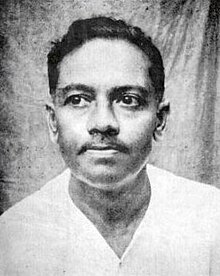Jibanananda Das | |
|---|---|
 Portrait of Jibanananda Das | |
| Born | Jibanananda Das 17 February 1899 Barisal, Bengal, British India |
| Died | 22 October 1954 (aged 55) Calcutta, West Bengal, India |
| Occupation | Poet, writer, and professor |
| Language | Bengali |
| Nationality | British Raj (1899–1947) India (1947–1954) |
| Alma mater | Brajamohan College University of Calcutta |
| Genre | Poetry, novels, short stories, criticism |
| Literary movement | Bengali Modernism |
| Notable works | Banalata Sen, Rupasi Bangla, Akashlina, Banalata Sen, Campe, Bodh |
| Notable awards | Nikhil Banga Rabindra Sahitya Sammelan Award (1952) Sahitya Akademi Award (1955) |
| Spouse | Labanyaprabha Das (née Gupta) |
| Children | 2 |
| Relatives | Kusumkumari Das (mother) |
| Signature | |
 | |
Jibanananda Das ( জীবনানন্দ দাশ ) (Bengali pronunciation: ['dʒibonˌanondoː daʃ]) (17 February 1899 – 22 October 1954)[1] was a Bengali poet, writer, novelist and essayist in the Bengali language. Popularly called "Rupashi Banglar Kabi'' ('Poet of Beautiful Bengal'),[2][3] Das is the most read Bengali poet after Rabindranath Tagore and Kazi Nazrul Islam in Bangladesh and West Bengal.[4][5] While not particularly well recognised during his lifetime, today Das is acknowledged as one of the greatest poets in the Bengali language.[4][6][7]
Born in Barisal to a Hindu family of Baidya Brahmin caste, Das studied English literature at Presidency College, Kolkata and earned his MA from Calcutta University.[3] He had a troubling career and suffered financial hardship throughout his life. He taught at many colleges but was never granted tenure. He settled in Kolkata after the partition of India. Das died on 22 October 1954, eight days after being hit by a tramcar.[8] Witnesses said that though the tramcar had blown its whistle, Das did not stop, and got struck. Some deem the accident as an attempt at suicide.[9]
Das was a rather unrecognised poet in his time; he wrote profusely, but as he was a recluse and introvert, he did not publish most of his writings during his lifetime. Most of his work were hidden,[3] and only seven volumes of his poems were published.[9] After his death, it was discovered that apart from poems, Das wrote 21 novels and 108 short stories. His notable works include Ruposhi Bangla, Banalata Sen, Mahaprithibi, Shreshtha Kavita.[3] Das's early poems exhibit the influence of Kazi Nazrul Islam,[3] but in the later half of the 20th century, Das's influence became one of the major catalysts in the making of Bengali poetry.[10]
Das received Rabindra-Memorial Award for Banalata Sen in 1953 at All Bengal Rabindra Literature Convention.[3] Das's Shrestha Kavita won the Sahitya Academy Award in 1955.[3] A film inspired by Das' short story Jamrultola, named 'Sunder Jibon' directed by Sandeep Chattopadhyay (Chatterjee), produced by Satyajit Ray Film And Television Institute[11][12] won the National Film Award for Best Short Fiction Film at the 50th National Film Awards with Shantanu Bose in the lead.
- ^ Sengupta, Subodh Chandra; Basu, Anjali, eds. (2010) [First published 1976]. Saṃsada Bāṅālī caritābhidhāna সংসদ বাঙালি চরিতাভিধান [Parliamentary character of Bengal] (in Bengali). Vol. 1 (5th ed.). Kolkata: Sāhitya Saṃsada. OCLC 18245961.
- ^ "Banglar Mukh Ami Dekhiyachi" বাংলার মুখ আমি দেখিয়াছি [I've Seen the Face of Bengal]. Prothom Alo (in Bengali). Transcom Group. 23 April 2017. Retrieved 7 June 2018.
- ^ a b c d e f g Islam, Sirajul, ed. (2012). "Das, Jibanananda". Banglapedia: the National Encyclopedia of Bangladesh (2nd ed.). Dhaka: Asiatic Society of Bangladesh.
- ^ a b Murshid, Ghulam (2016). "Bangla Bhasha o Sahitya" বাংলা ভাষা ও সাহিত্য [Bengali Language and Literature]. Hajar Bacharer Bangali Sangskriti হাজার বছরের বাঙালি সংস্কৃতি [Bengali Culture across the Millennia] (in Bengali). Dhaka: Abasar. p. 316. ISBN 978-984-415-190-1.
- ^ "Barishale Jibanananda Mela" বরিশালে জীবনানন্দ মেলা [Jibanananda Fair in Barishal]. Prothom Alo (in Bengali). Dhaka: Transcom Group. 6 December 2015. Archived from the original on 7 June 2018. Retrieved 7 June 2018.
বাংলা সাহিত্যে রবীন্দ্রনাথ ও নজরুল ইসলামের পর শ্রেষ্ঠ কবি জীবনানন্দ দাশ। নতুন প্রজন্ম জীবনানন্দ দাশকে ভুলতে বসেছে। জীবনানন্দের প্রকৃতি প্রেম ও দর্শন নতুন প্রজন্মের মধ্যে ছড়িয়ে দিতে হবে। ... বলেন রবীন্দ্র ভারতী বিশ্ববিদ্যালয়ের সাবেক উপাচার্য পবিত্র সরকার। Jibanananda Das is the greatest poet after Rabindranath and Nazrul Islam. The young generation is forgetful of Jibanananda. We should promulgate his love and view of nature among the new generations. ... said Pabitra Sarkar, the ex-VC of Rabindra Bharati University.
- ^ জীবনানন্দ দাশের কবিতার সংখ্যা কত?. Alokita Bangladesh (in Bengali). Retrieved 7 June 2018.
- ^ Salekeen, Seraj (2018). Jibanananda Das জীবনানন্দ দাশ. Jibani Granthamal [Biography Series] (in Bengali). Dhaka: Kathaprokash. p. 7.
আমৃত্যু নির্জন, অথচ মৃত্যুপরবর্তী কিছুকালের মধ্যে সমকালীন বাংলা কবিতার অন্যতম জনপ্রিয় কবিতে পরিণত হন জীবনানন্দ দাশ। Despite being desolate till death, Jibanananda Das became one of the popular poets of contemporary Bengali poems immediately after his death.
- ^ Salekeen, Seraj (2018). Jibanananda Das জীবনানন্দ দাশ. Jibani Granthamal [Biography Series] (in Bengali). Dhaka: Kathaprokash. p. 80.
- ^ a b Syed, Abdul Mannan, ed. (1998). "Parishishta". Jibanananda Daser Prakashita-Aprakashita KabitaSamagra (in Bengali). Dhaka: Abasar. p. 618. ISBN 984-446-008-5.
- ^ Das Gupta, Chidananda (1972). Jibanananda Das. Makers of Indian Literature. New Delhi: Sahitya Akademi. p. 13. OCLC 313728800.
For the younger generation of Bengali poets today, he [Das] has practically come to take the place of Tagore. His influence on them is all-pervading.
- ^ Sundar Jeebon | National Award winning short film | A diploma film@SRFTI, 20 June 2017, retrieved 9 March 2021
- ^ Chatterjee, Sandeep (3 May 2002), Sundar Jeebon (Short), Debolina Addhya, Ardhendu Banerjee, Santanu Bose, Sharmistha Chakravarty, Satyajit Ray Film and Television Institute, retrieved 9 March 2021